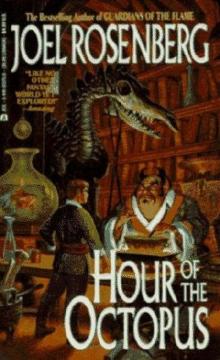- Home
- Joel Rosenberg
Not Exactly The Three Musketeers Page 3
Not Exactly The Three Musketeers Read online
Page 3
Pirojil smiled in agreement, enjoying the way that forced her to look upon his ugliness. 'True enough. Your Majesty, but whatever you might ask us to do would be our pleasure, of course, once we explain the necessity of our absence to the baronial regent."
She sniffed.
That had been a mistake, and he should have known better; Pirojil forced himself not to wince. Doria Perlstein was holding down that job at Castle Cullinane; and Doria Perlstein was one of the Other Siders, all of whom this dowager empress hated. He shouldn't have mentioned her.
"No," the dowager empress said, "that won't be necessary. Any necessary explanations will come from Biemestren and the emperor. You will go by way of Castle Cullinane, but you are to follow orders, and not let your tongues wag excessively. Understood?"
A pointless demand, as she certainly should have known and almost certainly did know. The three of them were fealty-bound, by oaths of the mouth and intents of the heart, to the Cullinanes. The chance that they would not report in full to the Cullinane regent was, at best, infinitesimally small.
But the dowager empress knew that, which meant that either she was just venting her spleen pointlessly or she had some subtler, deeper motives for giving an order she well knew they wouldn't consider obeying.
Pirojil nodded. "As you wish, Your Majesty, of course." Lying came easy to Kethol and Durine, as well:
"As you command," Durine said.
And from Kethol: "We won't discuss it."
She grunted. "Good. And as to where," she said, pulling a letter out of her pocket, "it is Keranahan. As to whom, it is Lady Leria Vor'sen."
Kethol looked over at Pirojil, who kept his face studiously blank.
Pirojil didn't know where Kethol had gotten the idea that Pirojil knew something about noble families, and he didn't much like Kethol hinting to others that he did. Durine, too, had, over the years, hinted that he suspected that Pirojil had been born noble, perhaps, but from the wrong seed perhaps, perhaps planted in the wrong womb. But there was nothing in that that Pirojil cared to display wantonly even to companions, much less to enemies.
Pirojil shook his head and spread his hands. "We're three ordinary soldiers, Your Majesty; we don't know much about such things."
Her laugh was quiet, but harsh, and held not a whiff of amusement. "I'm sure you'll do quite well, if you try hard enough. Now, Lady Leria is from an ancient Holtish lineage. You've never heard of Lord Lerian? As in Lerian's Vengeance?"
Pirojil could tell from the way Kethol didn't move that he knew what the dowager empress was talking about, but Pirojil didn't and it was only a little harder to tell the truth than it would have been for him to lie convincingly: "Apologies, Majesty, but..."
The dowager empress dismissed it with a wave. "Never you mind that, then. It doesn't matter. It probably won't matter to you, either, that she probably could make a good argument that she's the Euar'den heir to the Tynearian throne, but Keranahan and Holtun swallowed up Tynear and the Euar'den lineage five generations ago almost as neatly as an owl swallows a mouse - as neatly as I would have wished Bieme to have swallowed up Holtun.
"The problem is that she is a young, marriageable woman of some property and more potential political importance, placed in wardship to the barony, and she's managed to smuggle a letter out to me, asking my help, claiming that Elanee, Baroness Keranahan, is pressuring her to marry the putative baronial heir."
Durine let out another grunt. When you have spent enough years fighting and sweating and sometimes swiving side by side with someone, you could almost read that someone's thoughts given only the smallest of cues, and Durine's grunt spoke volumes. Durine thought it was a trivial matter to involve the dowager empress and themselves.
He was wrong. Pirojil would have shrugged and explained it to him if it had been politic. Anything involving the movement of money or power toward the baron's family might not be important, but it wasn't trivial.
Barony Keranahan was a conquered Holtish barony. The Keranahan family had given their name to the barony over which they reigned, but they didn't rule, and while imperial policy under the Cullinanes had been to quickly return loyal Holtish baronies to home rule, that had slowed during Tho-men Furnael's emperorship. Pirojil thought that wise, but it didn't much matter what a common soldier thought about it.
"It's just a minor matter, perhaps, of an overly romantic young girl," the dowager empress went on, "but she has appealed to my better nature, and I want to be sure that things go well with her."
Well, that was surely a lie: the dowager empress didn't have a better nature. And Pirojil didn't believe for a moment that the fate of one girl was something that Beralyn cared about.
But it still would bear looking into. There really shouldn't be a problem. The baroness of a ruled barony shouldn't have had enough authority to force any such thing.
Where was the governor, and what was he doing? Sitting on one thumb, counting his graft with the other?
It wasn't the fact of it. An overbred, spoiled chit had been forced into a politically convenient marriage before, and surely would be again. But the implications bothered him.
His thoughts must have been too easy to read on his face, because the dowager empress was looking him in the eye.
"The governor's name is Treseen," she said. "His regular reports to the emperor suggest no such problems, and while there have been some occasional interruptions in the telegraph from Neranahan, his reports do come in regularly, suggesting that there's nothing at all serious wrong." She sniffed. "Except, perhaps, one hysterical girl who overreacts to an obvious sort of suggestion from the baroness of an alliance that should benefit both families, the barony, Holtun, and the empire. Or perhaps the girl is not hysterical, and is merely reacting to the head of a snake, while the body lies concealed? You will investigate, and report fully, do you hear? Fully."
"Of course." Pirojil nodded. "Understood, Your Majesty. But - "
"But nothing." She turned to Captain Derinald, who handed over three scrolls, each wrapped with a ribbon and sealed, although with what seal, Pirojil could not have said.
"This," she said, holding up the first one, wrapped in a beige ribbon, "is your orders, unsigned; the second is the copy for the imperial archives." She paused for a moment, as though she had changed her mind about saying something, and then went on: "You'll need to get it signed by either Baron Cullinane, if he's honoring his home with his presence," she said, her voice dripping sarcasm, "or the Cullinane regent. You'll want to present these orders to Governor Treseen, as I doubt he'll take you seriously otherwise. You leave at first light; Derinald will travel with you to Castle Cullinane, see that the orders are signed, and will return with our copy. Just so there will be no problem later."
The third scroll she held hesitantly. "This is a death warrant, signed by my son. The name is blank, although the ... object of the warrant is described as 'a noble or subject of Barony Keranahan.' " She smiled briefly. "Yes, I know the story of Pirondael's Warrant, and while I think it's merely a tale, I've learned from it. If you were to use this, I would have to explain why to my son, and although he's a patient listener, I'll not try his patience unnecessarily. You are very simply not to use this unless you're willing to explain the necessity to me, and I am not a patient listener. But if you find it convenient, you may threaten somebody with it." She looked from face to face to face. "Do we have an understanding here?"
Pirojil nodded. "Yes, Your Majesty. But I do see some problems."
Her mouth twisted. "Oh?"
"For one thing, there's the matter of supplies and such. We're just ordinary soldiers, and while I'd be happy to spend the little I have in your service ..."
"Adequate monies will be provided," she said.
Pirojil ducked his head. "We are grateful for - "
"I said adequate, not generous. And there will be a full accounting, so I'd suggest you practice some economy. If you've need of coin for luxuries, you'd best speak to your patron, and not expect it from t
he Throne. This is not some furlough to be paid for by my son from the pittance he's able to eke out in taxes, and I'll look very unkindly on anybody who sees it otherwise. Do you all understand me?" She was looking very directly at Kethol for some reason.
Kethol nodded. "Of course."
Durine did, too. "Understood, Your Majesty."
"I understand, Your Majesty," Pirojil lied.
That was the problem. He didn't understand, not really. There was a lot about this that he didn't understand at all. He doubted that the dowager empress was lying to them, not exactly, but there surely was much she was leaving out, and that could easily be much of the same.
"Good." She turned to Derinald, and laid a wrinkled hand on his arm. "You will leave with them, first thing in the morning." She turned back to Pirojil. "Now get out of my sight."
When they stayed in Biemestren, the three rented a pair of rooms at a rooming house near the imperial barracks, just down the hill, at the base of the road that led up to the keep which dominated the city below.
It was far enough away from the Biemestren refuse heap that they didn't have too many rats, and a row of two-story buildings provided enough shade that their rooms didn't heat up too much during the day.
For a small bribe to the cooks, a fresh, covered tray from the soldiers' mess arrived twice a day, which kept them out of the way of the officers. House Guard officers all too often felt that they had to keep billeted baronial troops busy with doing something, and Pirojil had mucked out enough stalls, cleaned and oiled enough polearms, and walked enough extra guard patrols in his time.
Besides that, their pair of rooms gave them a private enough place to share an occasional whore brought up from the city. Safer than a dungtown brothel, and cheaper, too, when you split the cost three ways.
Arranging for the rooms had taken a bit of the sort of barracks politics that Kethol always despised aloud, that he said his father, a soldier-turnedhuntsman, used to swear was the ruin of good soldiering, but Pirojil didn't much mind when such things brought the sort of privacy that he and the other two liked for their own private reasons.
If Durine was moved by it, or by anything else, he didn't show it. It was the usual pattern: Kethol complained, Pirojil endured, and Durine didn't mind. Or at least he didn't mind aloud, not even to the other two.
It was one thing, of course, to be a private soldier, another to be a valued retainer, and yet another to be an expendable baronial man-at-arms in an age when private loyalties were being dissolved in an imperial soup, like overcooked turnips turning into textureless mush.
Pirojil had been a soldier long enough not to flinch at eating what was set before him, but he had been raised far away, in a house where one ate with one's backside on a well-carved chair and one's boots on a polished wooden floor, not on stools on packed dirt, and he had been used to dishes cooked properly and separately, each having its own character, not thrown in a pot to be turned into indistinguishable, neutral mush.
Pirojil had little use for mush, in any sense. If he had to be somebody's hireling, and he clearly did, he'd rather serve the Cullinanes, each of whose faces he knew, and not some dough-faced dowager empress or, much worse, an empire. You could put yourself in the way of a sword - and he had - thinking that it was your job to protect the sleeping children of the man who made sure you were housed and fed, or you could do it for the food and housing and money ...
But not for a faceless mush of an empire.
Durine shook his massive head as he sorted through the gems and coins scattered across the rough-hewn surface of the table. "It looked better on the street," he said. "But it's still an edible piece of meat."
"Well," Pirojil said, "if it fills the belly, it will serve."
"Aye," Kethol said.
They never spoke among themselves about money and valuables, except by indirection. You did the best you could to be sure you weren't overheard, but maybe the best wasn't enough, and it was of a certainty that uncountable throats and bellies had been slit for much less than this.
Pirojil picked up one gem, a fine amber garnet with only a minor flaw, and that just a speck close to the surface. It probably hadn't been visible when mounted.
Fairly cheap gems, certainly - he had hardly expected to find Durine taking a bag of rubies and diamonds off a pair of street thieves - but the garnets were good, and the crimson quartz was superb.
Kethol had been listening at the door long enough. At Durine's and Pirojil's nods of agreement, he joined them over by the small brazier they kept in front of the unlit fireplace. They always kept it lit, carefully stoked with expensive hard coal from Tyrnael, banked to a low heat, a cauldron of vile-smelling water useful for boiling fouled pistols clean always ready.
Durine took a couple of hooks from his rucksack and used them to lift the heavy cauldron. He took one careful step to the side, then set it gently on the dirt floor, while Pirojil and Kethol donned gloves and carefully moved the iron brazier itself.
A flat stone was set underneath, intended to give the brazier a flat surface; Durine took up his hooks again and lifted the stone up, revealing a hole beneath, and a leather bag, which he handed to Pirojil, who opened it.
The bag was opened to reveal a pair of leather strips, carefully intertwined with small, mostly silver but some golden imperial marks, the leather to prevent the money from jingling together.
The gems were unceremoniously dumped into the bottom of the bag - they wouldn't clink; the bottom quarter of the bag was filled with wool yarn, and the coins held jewels against it - and the bag closed.
Pirojil smiled, and while Durine pulled up his tunic and shirt, Pirojil strapped the bag to the big man's broad and hairy back. All three of them carried ordinary pouches containing the few coins that an ordinary soldier might have, but this was their cache. An ordinary soldier couldn't put away a lot of money, not on cot and stew and a handful of coppers at the end of every tenday, but if you kept your eyes and your mind open, and hung around with the right sorts of people, it was entirely possible to quietly put away a little something to see you and a couple of friends through your old age, on the off chance that you should reach an old age.
Particularly when you spent time as bodyguard to nobles who were less concerned about money than a commoner had to be. Money was hard to come by when you couldn't simply tax for it.
They replaced the flagstone lid over the hole in the floor, Kethol carefully setting three telltale pebbles in place before covering it with a light layer of dirt and making some sort of woodsman's mark in the dirt. The brazier was replaced, and the cauldron over that. While they would take their money with them, they would try to rent this same set of rooms the next time they were billeted in Biemestren, and if this hiding place remained undetected, it would be useful then, too.
Pirojil lay down on his straw bed, his sword and pistol beside him, and wrapped his cloak about him.
Durine would have preferred that the cache be kept somewhere in Castle Cullinane - the old castle had secret passages and hiding places galore - but Kethol agreed with Pirojil that they were best off keeping it with them.
Pirojil wouldn't have left it to two-out-of-three, anyway. Not on this. Not when it came to trusting a place. Places could betray you.
Pirojil could recall a time when an ugly young boy had been kicked out of what had been, up until that moment, his home, sent out into a cold and rainy night with nothing more than his cloak, his blade, and a spavined horse, to ride far away. He had sat all night in the rain, on a hilltop overlooking that place, figuring that surely, certainly, it was all a mistake, that it would be corrected, that somebody would come after him, to apologize, to explain, to bring him back into the dryness and the warmth.
In the morning, shivering in the damp cold, his eyes finally dry, he had gotten on the horse and ridden away.
Since then, he had too often let himself get attached to people, but never, ever to places. A place would let you down, a place would betray you, and there was
no way to erase the pain of that betrayal. Not when you tried to forget it, because you couldn't. Not when you tried to live with it, because it burned at you.
And not even when you returned in the middle of the night and burned it to the ground, watching from a nearby hilltop while flames and screams turned to ashes, because even after that, and even after you pissed on the ashes, the betrayal still stung.
No. Put not your trust in places. Put your trust in small bags, and watch the small bags. If you kept it with you, it was yours.
As long as you could fight to keep it.
He was quickly asleep.
Chapter 3
Doria
Like mice scrabbling in a constantly panicky but utterly futile attempt to escape from a closed cardboard box, spells pushed at the back of Doria Perlstein's mind, as they had for years.
It would have been simplicity itself to let one of the few remaining ones spew out, pleasantly vomiting from her mouth into the warmth of the baronial study, gaining substance and reality, hardening in the air like streams of melted sugar turning into hard candy, a dream given flesh.
One of the spells could have persuaded the annoying, handsome Home Guard captain of anything whatsoever, and the same impish sense of humor that used to get her into trouble as a child was tempted to make him believe he was a duck. It would be more fun than she had had in years to watch him fold his arms back like wings, squat, and quack his way around the study.
But no. The years with the Hand had taught her self-control in ways she was still learning to appreciate, and suppressing that sort of urge had been an early lesson. If you were going to be a Daughter of the Healing Hand, dispensing healing comfort through a gentle touch even more often than through a healing spell, you had to manage yourself before you could begin to manage others' hurts.
Doria had no regrets. She had given up the Hand, and with that the possibility of the Hand restoring a spell, once used. Spending one of her few remaining utterly irreplaceable spells on a moment of amusement for herself and embarrassment for a pretentious, pompous twit wasn't worth considering seriously.

 The Road Home
The Road Home The Sword and the Chain
The Sword and the Chain Not Quite Scaramouche
Not Quite Scaramouche Guardians of The Flame: To Home And Ehvenor (The Guardians of the Flame #06-07)
Guardians of The Flame: To Home And Ehvenor (The Guardians of the Flame #06-07) The Silver Stone
The Silver Stone Hero
Hero Not For Glory
Not For Glory The Sleeping Dragon
The Sleeping Dragon The Fire Duke
The Fire Duke Guardians of The Flame: To Home And Ehvenor (Guardians of the Flame #06-07)
Guardians of The Flame: To Home And Ehvenor (Guardians of the Flame #06-07) Hour of the Octopus
Hour of the Octopus Emile and the Dutchman
Emile and the Dutchman The Crimson Sky
The Crimson Sky Guardians of the Flame - Legacy
Guardians of the Flame - Legacy The Silver Crown
The Silver Crown Not Exactly The Three Musketeers
Not Exactly The Three Musketeers Not Really the Prisoner of Zenda
Not Really the Prisoner of Zenda